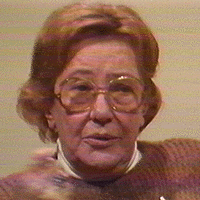The testimonies are boring because they are not the continuous unravelling of horrors and personal tragedies that we are led to expect by our exposure to general Holocaust history. This is certainly not to belittle the almost unspeakable accounts of cruelty and suffering that do appear throughout the videos, but rather to point out that there is a surprising amount of time between those accounts where the survivors are telling the story of how they were trying to live a normal life despite the world around them. These, after all, are the stories of the survivors.
 As such, the videos are long-winded, and often contain accounts of long stretches of people's lives-some of them stretching for nearly twenty years from the late 1920s to the late 1940s. It's said that the three hardest things about writing, storytelling, or explaining are knowing where to start, knowing where to stop, and what to put in the middle. How much harder those things are for survivors having to explain-with the added pressure of a video camera running in their face-their experience of a time that they have spent the majority of their adult life trying to forget. And we shouldn't forget that survivors, like the population as a whole, include only a small proportion of gifted storytellers.
As such, the videos are long-winded, and often contain accounts of long stretches of people's lives-some of them stretching for nearly twenty years from the late 1920s to the late 1940s. It's said that the three hardest things about writing, storytelling, or explaining are knowing where to start, knowing where to stop, and what to put in the middle. How much harder those things are for survivors having to explain-with the added pressure of a video camera running in their face-their experience of a time that they have spent the majority of their adult life trying to forget. And we shouldn't forget that survivors, like the population as a whole, include only a small proportion of gifted storytellers.
Finally the videos are tedious because they are made up, typically, of 90 or 120 minute uncut takes of a single talking head in which the only variation is the occasional slow zoom. For a population brought up on an MTV-influenced mainstream, a flashing hyperlinked Internet, and the ongoing revolution in digital video, the formal appearance of the videos in the Fortunoff archive -irrespective of the content-is nearly unwatchable. There is almost no action, and even the dialogue is negligible: very occasionally a brief question or prompt will come from behind the camera, or a disembodied hand will offer a glass of water or a tissue.
And I say... bring it on!
There are many positive virtues of the boring, unedited Holocaust testimonies, and in an age in which we seem to want to package everything to accommodate the so-called realities of short-term attention spans, they are worth exploring. As Fredric Jameson famously pointed out ( Postmodernism, or, The Cultural Logic of Late Capitalism, p71) boredom, in both the Freudian and Marxist traditions, is related more to blocked energies on the part of the audience than any 'problem' with the object of study. As Jameson put it "what is boring can often be very interesting indeed" and there are a number of ways in which the 'boredom' of the archive is vitally interesting.



The Queer Guy at the Strip Club
Jay Michaelson
The Gifts of the German Jews: Toward a Postmodern Judaism
Michael Shurkin
My first shabbos
Jennifer Waters
Stones of Jerusalem
David Goldstein
Holocaust Video Testimonies: The Other Reality TV
Dan Friedman
Josh Tells a Bedtime Story
Josh Ring
Zeek in Print
Buy online here
Saddies
David Stromberg
About Zeek
The Zeek Archive
Links